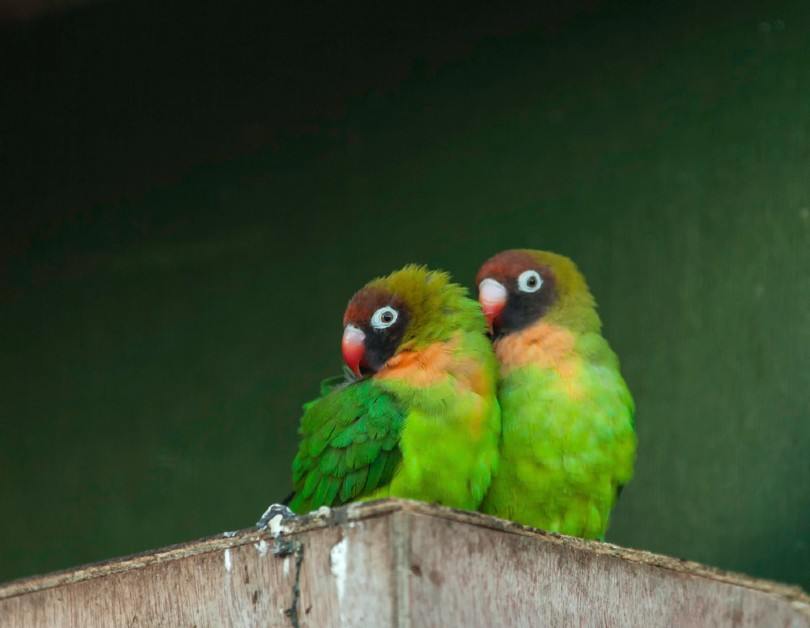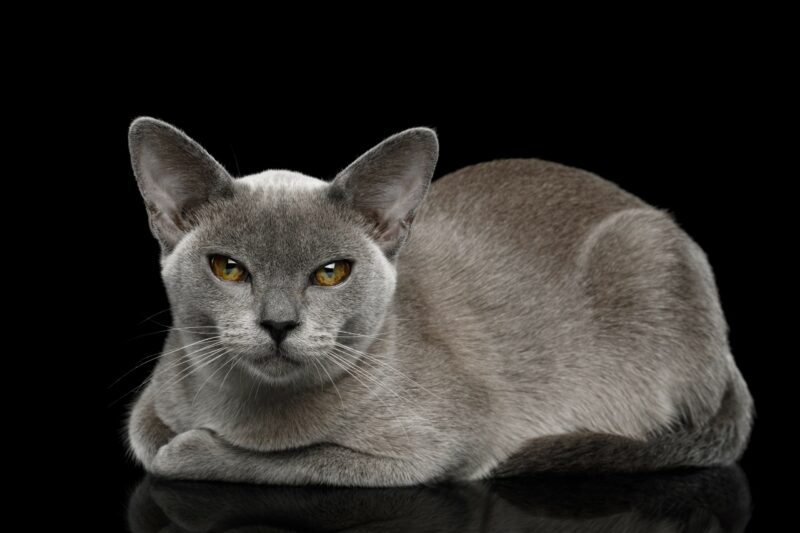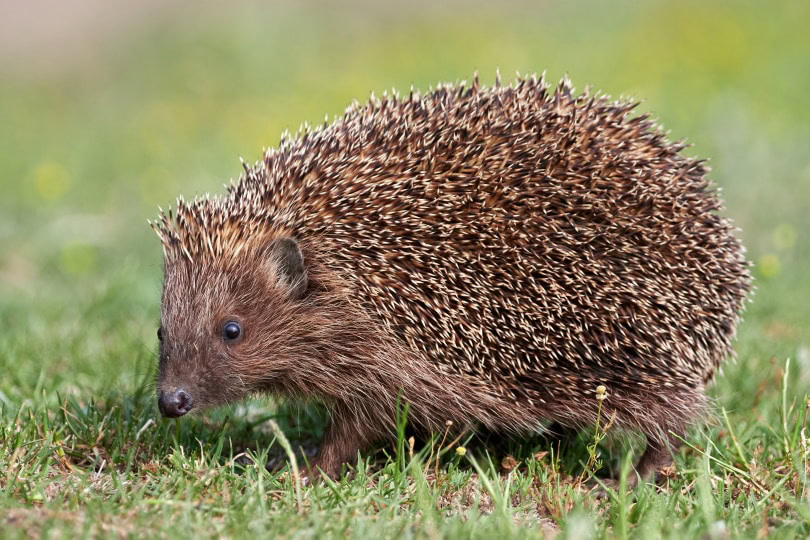Click to Skip Ahead
The Black-Cheeked Lovebird is one of nine different species of Lovebirds. They are one of the smallest birds in the parrot family. Unlike other parrots, they don’t usually speak. They are still rather noisy, though, and need plenty of care and attention. Keep reading to learn more about these birds, their history, and how to care for them.

Species Overview
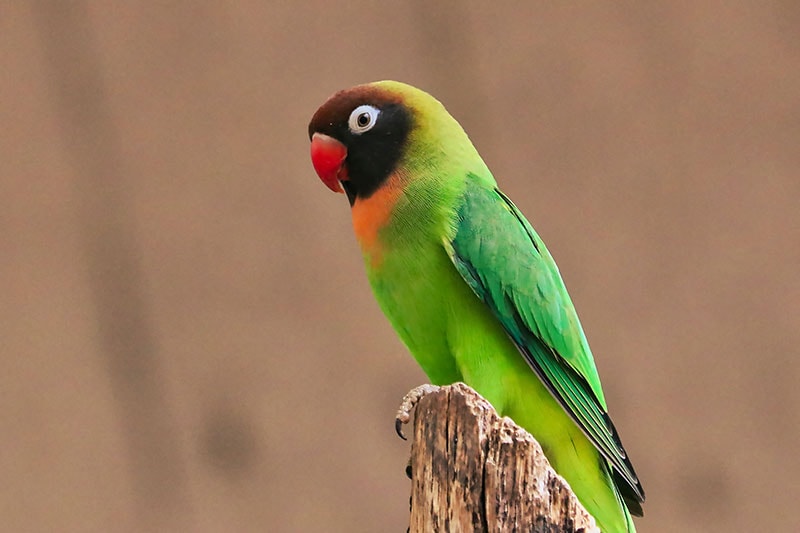
| Common Names: | Black-Cheeked Lovebird; Black-Masked Lovebird |
| Scientific Name: | Agapornis nigrigenis |
| Adult Size: | 5 to 5.5 inches; 1 to 1.5 ounces |
| Life Expectancy: | 15 to 20 years |

Origin and History
Black-Cheeked Lovebirds are native to a small area of southwestern Zambia. They weren’t known to Europeans until the early 1900s. However, after their discovery, the Black-Cheeked Lovebirds were often trapped and exported to Europe for the pet trade.
Once populous in the wild, they are now considered vulnerable. Habitat size limitations reduced access to fresh water, and over-trapping for the pet trade have decimated the wild population. Trapping of these birds in the wild is currently banned.
Those that are now sold as pets are bred under human care.
Temperament
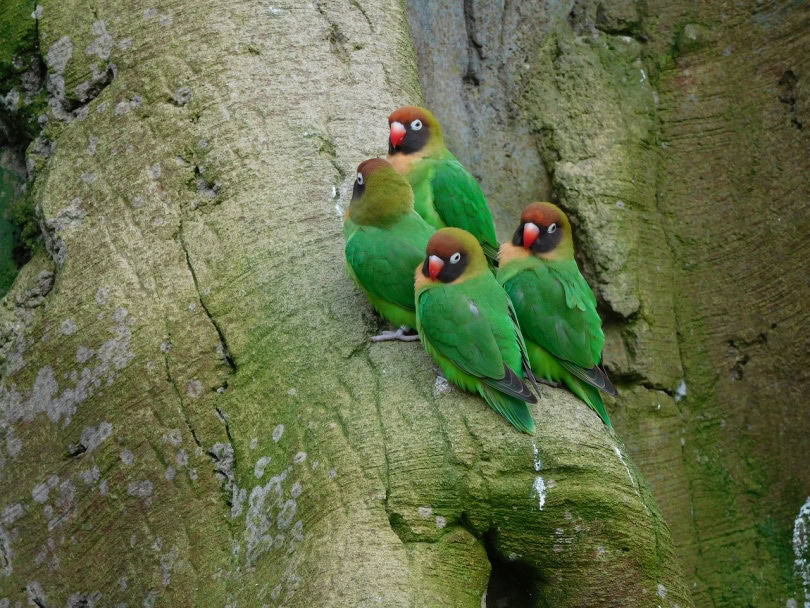
Black-Cheeked Lovebirds are known for their social and playful nature. As pets, they love to play and explore their surroundings. They will connect with their owners if they are the only bird in the home. If you have two Lovebirds, they are more likely to bond with each other than with you.
They can become depressed and jealous if not given enough attention, so this is something to keep in mind. If you cannot spend much time with your bird, you’ll need to get them a mate.
These birds love to be active, so they need plenty of exercise and toys. They are intelligent and enjoy a variety of entertaining games with their toys. You’ll want to give them plenty to do so they don’t get bored.
- Cuddly and loving pets
- Social
- Playful and entertaining
- Can be noisy
- Need plenty of attention
Speech & Vocalizations
Although they are members of the parrot family, the Black-Cheeked Lovebird typically doesn’t speak. They do have the ability to copy human sounds, but they usually communicate by making loud shrieking noises. They’ll also chatter to themselves and other birds. Their tendency to be quite loud doesn’t make them a good choice for apartment dwellers.
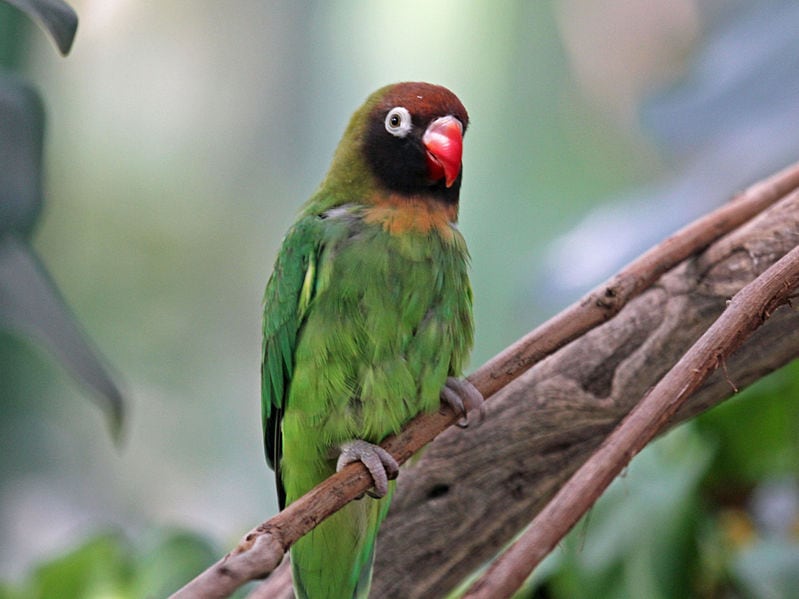

Black-Cheeked Lovebird Colors and Markings
The Black-Cheeked Lovebird has a bright-green body and tail. Their neck is olive green, transitioning to orange on the chest. The top of their head is brown and their cheeks are black. They have a red bill and grey feet. Their eyes are black, with a bright white ring around them.
Both males and females look similar. Juvenile birds have duller colors until their first molt. Then they acquire the brighter appearance of their parents.

Caring for the Black-Cheeked Lovebird
Black-Cheeked Lovebirds require the same level of care as most other members of the parrot family. They need plenty of space to move around and a great deal of attention if they are to thrive. Here are specific tips for caring for your bird.
Pairing
You can pair Lovebirds, and they will likely get along just fine. However, they will also breed if you pair a male and female Lovebird. This species doesn’t have the difficulties of breeding when kept as pets that some other parrots have. If you aren’t prepared to raise a whole family, you’ll want to keep one Lovebird only.
It is also important to note that pairs of Lovebirds will bond closely with one another. They will typically ignore their human caregivers and only focus on the other bird. They also will become depressed if the other Lovebird passes away.
That said, if you don’t have much time to spend with your bird, they’ll need an avian companion to keep them happy and socially fulfilled.
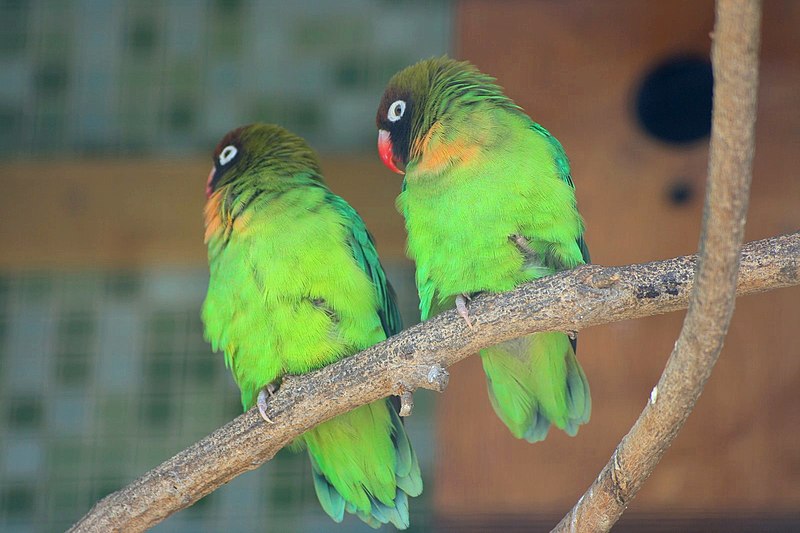
Grooming
If you have two Lovebirds, they will groom each other. A single bird will groom themselves. You will need to give them a dish of clean water at least twice each week so they can take a bath — they love bathing!
As for feather and nail clipping, both of these are best done by a qualified avian veterinarian.
Cage
Lovebirds are active little birds. They need a cage that is a minimum of 18”W x 18”D x 24”H. A bigger cage is also fine. The cage needs to have plenty of perching areas for your Black-Cheeked Lovebirds to sit and rest.
You’ll need to clean the cage daily to prevent dangerous bacteria from collecting. Perches, toys, food and water dishes, and anything else in the cage should be a part of your cleaning routine.
You should keep the cage in a room with a moderate temperature between 65 and 75 degrees Fahrenheit.
Entertainment
Black-Cheeked Lovebirds adore toys! They are also chewers, so make sure any toys that you give them cannot break and injure your bird. Wood, sisal, and leather toys are good options. They may also enjoy cardboard tubes, bells, and ladders that they can climb. You should change the toys in the cage frequently to prevent boredom.
Common Health Problems
As long as their environment is kept clean and they have enough attention, Lovebirds are typically healthy birds. However, there are a few conditions that they are prone to. These include:
- Feather plucking: This is typically the result of boredom; your bird may over-pick their feathers, resulting in feather loss and skin irritation.
- Chlamydiosis: You should monitor your bird for nasal discharge, appetite loss, or fluffed feathers. Veterinary care is needed.
- Avian pox: You may notice sores in their mouth or around their eyes and face. Veterinary care is required.
- Psittacine beak and feather disease: If you see beak deformities, broken or discolored feathers, or a significant loss of feathers, you’ll need to take your Lovebird to the veterinarian right away.
Diet and Nutrition
Black-Cheeked Lovebirds need to eat a balanced diet. It should include bird pellets, fruits, and vegetables.
The bird pellets should make up about 60-70% of their diet. Lovebirds like many different fruits and vegetables, including:
- Apples
- Berries
- Oranges
- Green beans
- Peas
- Lettuce
- Carrots
- Celery
You can also feed your Lovebirds occasional treats and other seeds.
Exercise
Black-Cheeked Lovebirds are active and require time outside of their cage every day for exercise. They are also known for being brave and curious, so make sure the space you provide for them is free from dangers. Ceiling fans, hot surfaces, and toxic plants are all potential hazards.

Where to Adopt or Buy a Black-Cheeked Lovebird
You should expect to pay between $90 to $150 for a Black-Cheeked Lovebird. The best place to buy one is from a reputable breeder who has experience breeding healthy birds. It is illegal to trap these birds in the wild, so make sure you are getting a bird bred under human care. You may also be able to find these birds in pet stores or specialty stores, but it will be more difficult to ask questions about the breeding and health of the bird at these places.

Conclusion
Black-Cheeked Lovebirds are good pets for people who know how to care for birds. They need attention and a clean environment to thrive. Keep in mind that they are noisy, so if you live in an apartment, this might not be the bird for you.
However, if you are willing to tolerate a noisy housemate, have the time to care for them, and want an attentive companion, then you should consider a Black-Cheeked Lovebird.
- Related Read: Can Lovebirds and Cockatiels Live Together in One Cage?
Featured Image Credit: Smiler99, Shutterstock
